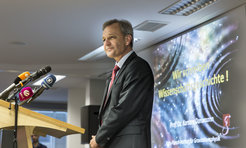Karsten Danzmann receives Fritz Behrens Foundation Science Prize
AEI Director honoured for his contributions to gravitational wave astronomy
On 29 November 2016, Prof. Karsten Danzmann, Director at the Max Planck Institute for Gravitational Physics and Director of the Institute for Gravitational Physics of the Leibniz Universität Hannover received one of the two Science Prizes of the Fritz Behrens Foundation for his life’s work and especially for his contributions to the first direct detection of gravitational waves and to gravitational wave astronomy. Each prize is endowed with 30,000 euros in research funds; the Foundation has awarded them to outstanding researchers every two years since 2010.
“Karsten Danzmann is awarded the prize for setting up large-scale, visionary projects at the international forefront of research and leading a large team, for the courage this required and for the enthusiasm he generated among his colleagues and students,” said Prof. Rolf Heuer, President of the Deutsche Physikalische Gesellschaft (DPG, German Physical Society), in his presentation speech at the award ceremony held in the Herrenhausen Palace auditorium on November 29.

Danzmann’s research team at the Max Planck Institute for Gravitational Physics (Albert Einstein Institute, AEI) and at the Institute for Gravitational Physics at Leibniz Universität Hannover made key contributions to the first direct detection of gravitational waves. This breakthrough discovery of the ripples in space-time that Albert Einstein predicted a century ago, in 1916, was achieved in late 2015 with the LIGO detectors in the US. The LIGO instruments are operated by an international collaboration and, on 14 September 2015, detected the gravitational waves emitted when two black holes merged. The LIGO Collaboration presented these findings to the international public on 11 February 2016.
Under Danzmann’s leadership, important detector technologies of the LIGO instruments were developed and tested in Hannover. Together with British partner institutions, the Albert Einstein Institute and the Leibniz Universität south of Hannover operate the GEO600 gravitational wave detector. In the LIGO collaboration, this instrument serves the development of new technologies and as a test bench for advanced technologies.
Now that the first gravitational waves have been directly detected, a completely new branch of astronomy will emerge in the coming years, with regular – possibly weekly – measurements. Gravitational waves will paint a more complete picture of black holes, neutron stars and supernova explosions, and could eventually even make the echo of the Big Bang audible.
Danzmann also plays a leading role in the LISA mission, which will be the first gravitational wave detector in space in the 2030s. With laser paths measuring millions of kilometres, it will receive particularly low-frequency gravitational waves and will broaden and supplement the measurements of the terrestrial detectors. Furthermore, together with Stefano Vitale from the University of Trento, Danzmann is Co-Principal Investigator of the LISA Pathfinder mission, which demonstrated key technologies for LISA in mid-2016.
Danzmann already received two other awards in 2016: the Lower Saxony State Prize, together with Bruce Allen and Alessandra Buonanno, and the Lower Saxony Science Award.
The non-profit Fritz Behrens Foundation was established in 1923. In addition to science, the foundation also supports and promotes projects in the areas of art, social charity and historic preservation. The Science Prize was first presented in 2010 and has since been awarded to two outstanding scientists every two years. With this prize, the Foundation honours not only a well-known and deserving researcher, but also promising junior researchers. The Science Prizes of the Fritz Behrens Foundation are endowed with 30,000 euros in research funds for each of the two winners.
In addition to Karsten Danzmann, literary scholar Kai Sina from Georg-August-Universität Göttingen received the Science Prize of the Fritz Behrens Foundation in 2016.












